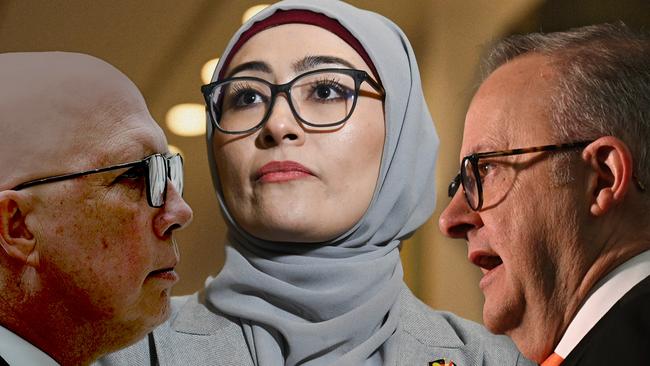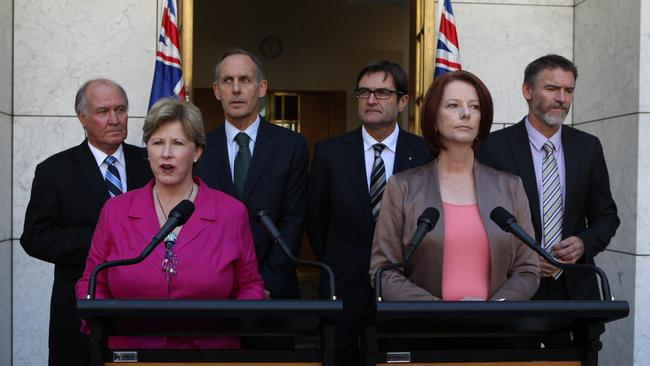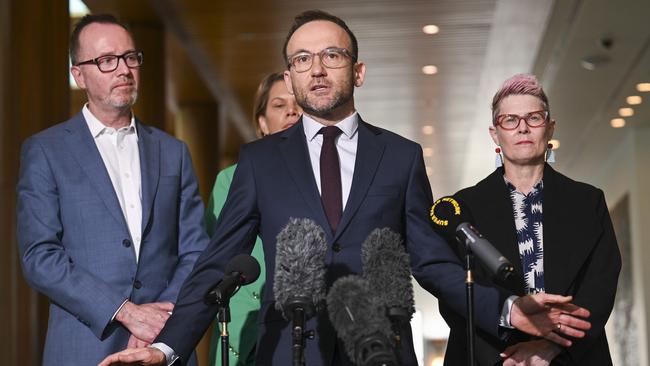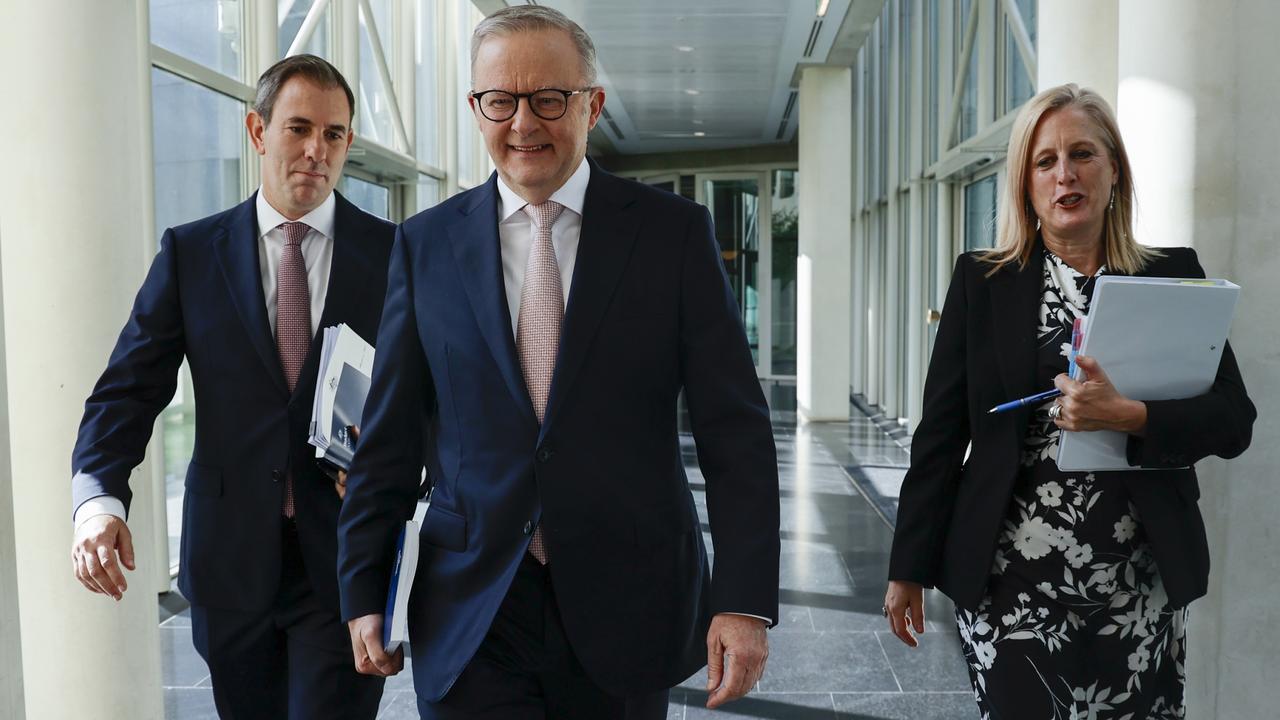
There are many consequences but one is guaranteed – Anthony Albanese cannot enter a governing alliance with the Greens in response to Labor post-election being reduced to minority government. The situation that allowed the 2010 alliance between the Gillard government and the Greens no longer exists, a reality that Albanese would readily understand.
Any such working compact or alliance would taint and doom his government as an acceptable mainstream force. Such is the transforming impact of the domestic political animosities generated by the war.
But the rift between Labor and the Greens also transcends the war – the Greens have intensified their policy and electoral drive to challenge Labor on a broad base from the left. The rivalry between the two parties for an overlapping constituency has scaled a new intensity.
The war offers a startling insight into the real character of the Greens, remarkably disguised for much of the public for so long. It has shattered assumptions about tolerable boundaries applying to the political left in Australia.

As a party the Greens have indulged anti-Semitism, provoked bitter community splits for their self-interest, defended pro-Palestinian and pro-Hamas demonstrations against both Israel and Australian values, excused the desecration of our war memorials, falsely accused the Albanese government of war crimes, attacked not just Israel’s war tactics but its discretion to defend itself and fudged on a two-state solution, raising doubts about whether they believe Israel has an enduring right to exist as a Jewish homeland.
For Labor, this is not an alliance partner. Peter Dutton says Greens leader Adam Bandt is “unfit for public office” and he has branded the Greens as “evil”. Last month in parliament, Albanese launched a political attack on the Greens accusing them of accentuating divisions and promoting lies, and left the impression they were catalysts in growing community violence. He declared “enough is enough”.
Dutton would refuse to accept the legitimacy of a Labor-Greens alliance as the basis for a government. He is already signalling his nightmare depiction of Albanese minority government, saying last week: “If you think the Albanese government is bad now, wait for it to be in a minority government with the Greens, the green teals and Muslim independents.”
That will be a long wait because it will never happen. The steel has entered the calculations of many Labor ministers who lived through the Gillard era. Greg Combet told me afterwards that Labor never got clean air as a government because nearly everything it did was cast as being beholden to the Greens.

Albanese’s entire history reveals he would never succumb by compromising his prime ministership to the Greens. And – critically – he wouldn’t need to engage in such self-destructive tactics.
Albanese doesn’t need a governing alliance with the Greens to get a commission from the Governor-General.
Only one thing matters – getting a majority of the House of Representatives on a vote of confidence. That would happen because neither the Greens nor most independents would want Dutton as prime minister. The Greens might try to negotiate serious concessions but Albanese would have no reason to make them.
When it came to the passage of legislation Albanese would merely negotiate issue by issue with lots of flexibility given the size of the crossbench in the House of Representatives.
In truth, it is hard to imagine the Greens would want to become part of any Labor governing arrangement. How could they? Every sign is their current approach is to challenge Labor, not partner with it. Their tactic of maximising differences from Labor means the Greens, given their moral separation from Labor, their stand on the Middle East, their rejection of AUKUS and their climate and cultural extremism, have eliminated the basis for any minority governing deal.
Labor, no doubt, is grateful for that. At the same time Labor’s hold on the Muslim vote has been dramatically fractured by the Middle East conflict and the defection of West Australian senator Fatima Payman, who has been transformed into a rallying symbol of anti-Labor Muslim sentiment.
Payman’s break from Labor and her refusal to accept Labor’s stance on the war – despite its growing criticism of Israel – creates a sectarian wedge of unpredictable dimensions.
Labor is the immediate target and loser. Among the many people Payman consulted was the organisation The Muslim Vote, motivated by the Gaza war, promising to campaign against Labor MPs and now given the assistance of Payman’s stance though she is not formally affiliated with it.
The deeper casualty is the Australian multicultural compact, based on the increasingly forlorn proposition that people who come to this country should not bring the conflicts of their originating nations to their new land.

Australian multiculturalism has fallen victim to a self-congratulating complacency and a dramatic shift in progressive ideology. The more the left promoted a tribal and identity politics based on race, ethnicity, religion, sex and gender, the more it attacked the principles of multiculturalism by encouraging the growth of separate group rights.
This inevitably led to social and political fragmentation.
Group rights become the new mantra, weakening the power of national harmony. The left has sown the seeds for the current discord. Given the inflamed conflict in the Middle East, new demands are coming from Palestinian and Muslim communities. Why should we be surprised?
The Muslim Vote website offers cheap assessments of mainly Labor MPs that it threatens on the sole basis of the Middle East war where Australia has no role, its high-profile targets including Jason Clare, Tony Burke and Chris Bowen.
The drum-beating typifies an organisation in overreach: “The next Federal election signals a shift … Australian Muslims are a powerful, united force of nearly 1 million acting in unison. The Muslim Vote alone is capable of forcing the current government into minority government.”
The threat is that a sectarian campaign by Muslims will terminate Albanese as majority Prime Minister. That is improbable. But can you imagine the damage to the country if it happened because of a religious vote?
Labor’s primary vote in western Sydney, while facing several threats, is unlikely to collapse, though much depends on the selection of the independent candidates.

Tragically, the real victims will be the Muslim communities. Most Australians will reject faith-based campaigns and parties. A backlash from the right wing is certain and will not be limited to Pauline Hanson. If the Muslim campaign proceeds the upshot will be a debate about Muslim immigration to Australia – nothing is more certain.
This will be a test of Muslim leadership in Sydney. It is encouraging that Australian Federation of Islamic Councils president Rateb Jneid said they wanted to encourage Muslims to participate in politics but it was “unlikely that AFIC would preference any candidate above another”.
In short, Muslim leaders will not automatically abandon the major parties in a quest to punish the Albanese government. That is important but it won’t diminish Payman’s symbolic appeal to an alienated Muslim vote.
For nine months the Albanese government tried to pacify pro-Palestinian sentiment. Its response to angry protests and rising violence was unconvincing gesture. The Jewish community is largely appalled by Labor and much of the Muslim community is dissatisfied, the upshot being hostile threats from The Muslim Vote.
Deepening fragmentation is the curse of Western democracy. The Coalition in office suffered from fragmentation of the right; Labor in office will suffer from growing policy disruptions and cultural divisions within the left, an unravelling that will have a long fuse.








The Albanese government is under assault from the permanent fracturing of the left of politics – the Gaza war exposing the divisive extremism of the Greens and a push for a faith-based Muslim vote aligned against the Labor Party.